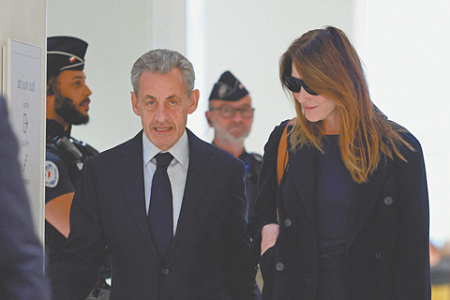
Former French President Nicolas Sarkozy, who led the nation from 2007 to 2012, has been convicted of complicity in a criminal conspiracy, a stunning verdict in a long-running scandal involving illicit campaign funds from the late Libyan dictator Muammar Gaddafi. The ruling adds a dark chapter to Sarkozy’s legacy, directly linking his rise to power with a regime he would later help to overthrow, and raises profound questions about the intersection of diplomacy and corruption at the highest levels of global politics.
A Paris court sentenced the 70-year-old ex-president to a five-year prison term, ordering him to be taken into custody within a month. While Sarkozy was acquitted of more direct charges of corruption and illegal campaign financing, the judges found him culpable for “allowing” his closest associates to orchestrate a deal with Gaddafi’s regime. The court determined that even if Sarkozy was not the mastermind, he bore ultimate responsibility for the criminal pact forged by his inner circle to secure funding for his victorious 2007 presidential campaign.
The prosecution painted a cinematic picture of suitcases filled with cash being funneled from Libya to France. In exchange for this financial support, Sarkozy was allegedly expected to help rehabilitate Gaddafi’s international image, at a time when Libya was a pariah state accused of sponsoring terrorism. Also convicted in the conspiracy were Sarkozy’s former campaign manager, Claude Guéant, and his close ally Brice Hortefeux, who later became a minister in Sarkozy’s government.
The verdict casts a dark shadow over one of the most significant foreign policy decisions of Sarkozy’s presidency: France’s leading role in the 2011 NATO-led military intervention in Libya. The operation, which led to Gaddafi’s ouster and death, now fuels persistent speculation that Sarkozy may have been motivated by a desire to permanently silence a key witness to his own alleged crimes. The theory gained traction after Gaddafi’s son, Saif al-Islam, publicly demanded in March 2011 that Sarkozy “give us back our money” just as the international campaign against his father’s regime was ramping up.
The case was built over years, heavily relying on media investigations and the testimony of key intermediaries. A pivotal figure was Lebanese-French businessman Ziad Takieddine, who claimed in a bombshell interview to have personally delivered suitcases of cash from Libya. However, in a dramatic twist, Takieddine fled to Lebanon, recanted his testimony, and then died of a heart attack just days before the trial began, leaving a void at the heart of the prosecution’s case and possibly contributing to Sarkozy’s acquittal on the more serious charges.
This conviction is the latest and most serious in a series of legal battles that have plagued Sarkozy since he left office. He has previously been found guilty in separate cases of corruption and illegal spending during his failed 2012 re-election bid, though he has appealed both verdicts. While Sarkozy is expected to appeal this latest ruling as well, the court’s decision that he must be imprisoned marks a dramatic fall from grace for a man who once stood at the center of French and world power.
